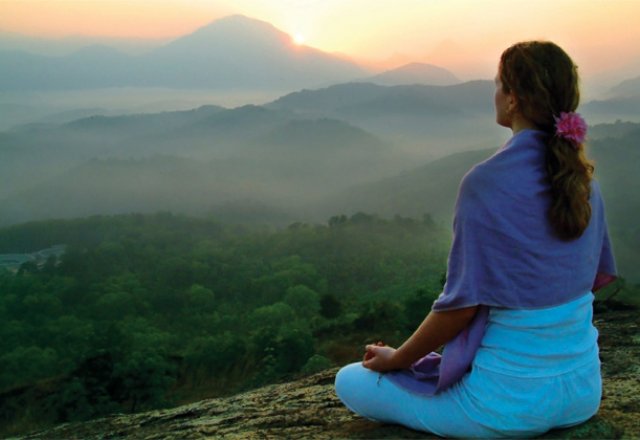
Fasting - the restorative effects

Naturopath Sally Mathrick explains the restorative effects of fasting in a fast lifestyle.
It is a practice that has been used for centuries to heal imbalances, restore youthful vigour and enables us to become more connected with the spiritual aspects of our selves. In a society prevalent in diseases from overconsumption and excessive stress, many could benefit from simple, regular, well-planned fasting periods.
For six to ten hours every 24 hours, everyone undergoes a nocturnal fast. While we sleep, remarkable cleansing processes are undertaken within our brains and our bodies. Melatonin, the hormone responsible for us dropping off, acts as a major antioxidant that repairs us while we rest.
This nightly fast is a key method for deep and effective detoxification and for repair and restoration. However, if we go to bed on a full stomach, the benefits of a nocturnal fast are thwarted. During sleep, our body energies will be focused on digesting rather than repairing and cleansing and we won’t feel as rejuvenated when we awaken. As the process of digestion uses a lot of energy, fasting essentially frees up that energy for use within the body.
What is fasting?
Fasting is an extreme method of cleansing and detox. There is some controversy among natural therapists about the benefits of total or water fasting. Given the toxicity of the world today, undergoing preparation is important to fast effectively and safely. The body needs to be well nourished, with all of the nutrients involved in detoxification pathways available for it to use. If unprepared, the toxins released from cells during fasting can create more damage and be redeposited elsewhere in the body, rather than being released. If unsure, read widely before you undertake a fasting period of more than one day. Consult with a natural hygienist or naturopath for an individualised plan, particularly if planning on doing a fast of long duration.
What does it involve?
Fasting involves the restriction of foods and a reduction of food energy, or calories consumed. Thus far, calorie restriction is the only scientifically endorsed enhancer of longevity. Epidemiological studies of populations with enhanced longevity, such as the Japanese island of Okinawa, have endorsed that health is often more about what we don’t eat. Contemporary epidemics such as cardiovascular disease, diabetes, even cancer, all have the underlying common denominator of high calorie intake, an overconsumption of the calories we really don’t need. My suggested method of calorie restriction involves eating kilograms of vegetables of all kinds every day. Vegetables are generally low in energy and high in beneficial nutrients.
Health benefits
Fasting heightens detoxification. Toxins are liberated into the blood stream from storage in fat cells within the body and brain. In well-prepared circumstances, the toxins are transformed by a well-nourished liver and excreted via the bile, urine, sweat or breath.
The benefits of fasting when done correctly can be profound. Fasting results in the body using stored excesses for fuel, a process known as autophagia, literally ‘self-eating’. There is new research suggesting that this may be a key cancer prevention strategy. Fasting rests the digestive system and allows the body to focus on repair and restoration that is nothing short of remarkable.
Fasting can clear old rubbish from the body, and can allow us to access the subtler aspects of being human. As Dr Gabriel Cousens puts it, “If the subtle channels of the body are not blocked due to undisciplined habits of eating and an immoderate lifestyle, the spiritualising energy is able to act with its full force.”
SPIRITUAL
Many religious or spiritual pursuits involve fasting. Indeed, every major religion of the world endorses some form of annual fasting. The Christians have Lent, Muslims have Ramadan and Jews have Yom Kippur. These religious periods are allocated as times of clarification and purification, with the overriding goal of attaining a closer connection to the divine, or to become more attuned to our own spiritual essence. Buddha learnt to fast while cultivating compassion and patience. Cleansing our physical and mental self provides easier access to our subtle, spiritual aspects. Fasting accelerates that insight.
In Arabic or Tibb medicine, detoxification fasts are still used. Naturopathic physicians revived the fasting tradition in the West, with many doctors laying down guidelines to follow.
Fasting demands you simplify and slow down your life. When undertaking a fasting period, one may find an alignment with the gentle rhythms of the body and of nature. Tibetan medicine believes that the pulses of the earth heal our nervous systems. Fasting allows you to tune in. The quietening down required, can be quite highly challenging when accustomed to the modern buzz that many of us are caught up in every day. To the ancient Greeks, fasting was conducive to bringing visions and dreams that the priests and priestesses could interpret. Fasting intensifies thoughts and wishes, according to David Wolfe’s Sunfood Diet Success System. Our abilities to realise our mental patterns are accelerated when we fast.
Jethro Kloss, a pioneering naturopath in the US, wrote about the clarity of mind achieved through fasting, and the ‘victory over appetite’ through no longer needing to tend to the feeding of the body. Any fasting procedure will bring your relationship with food into focus. In my experience, it brings about a great sense of empowerment and respect for food, and enhances mindfulness in making the healthiest food choices. The understanding of ‘you are what you eat’ can become more profound with every fast undertaken.
Additionally, fasting frees up lots of time because there’s no shopping, food preparation, food eating or clearing up. The best approach is to avoid filling this time with 'things to do', but instead just be present and observe yourself. Be in nature as much as you can. Watch the natural world around you, and see if you can adopt a fresh approach to it. Fasting is a great opportunity for reflection and planning. It’s a time of keeping things simple, getting to the important parts of life, and consuming things that are really nourishing you. NH
Sally Mathrick is a naturopath who runs Sparkle Wellness & Detox presentations, courses and retreats. See www.sparklewell.com.au for a free e-guide on simple detox and cleansing advice.
Photo credit: Thinkstock


